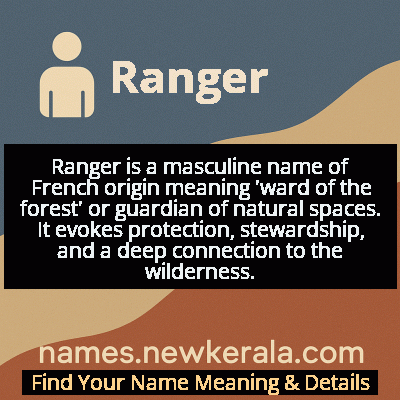Ranger Name Meaning & Details
Origin, Popularity, Numerology Analysis & Name Meaning of Ranger
Discover the origin, meaning, and cultural significance of the name RANGER. Delve into its historical roots and explore the lasting impact it has had on communities and traditions.
Name
Ranger
Gender
Male
Origin
French
Lucky Number
9
Meaning of the Name - Ranger
Ranger is a masculine name of French origin meaning 'ward of the forest' or guardian of natural spaces. It evokes protection, stewardship, and a deep connection to the wilderness.
Ranger - Complete Numerology Analysis
Your Numerology Number
Based on Pythagorean Numerology System
Ruling Planet
Mars
Positive Nature
Generous, passionate, energetic, and humanitarian.
Negative Traits
Impulsive, impatient, moody, and can be overly emotional.
Lucky Colours
Red, maroon, scarlet.
Lucky Days
Tuesday.
Lucky Stones
Red coral, garnet.
Harmony Numbers
1, 2, 3, 6.
Best Suited Professions
Military, sports, philanthropy, leadership roles.
What People Like About You
Courage, energy, leadership, generosity.
Famous People Named Ranger
Ranger Ross
Professional Wrestler
Known for his tag team performances in various wrestling promotions
Ranger Bass
Military Officer
Served with distinction in the United States Army Rangers
Ranger Suarez
Baseball Player
Professional pitcher for the Philadelphia Phillies
Name Variations & International Equivalents
Click on blue names to explore their detailed meanings. Gray names with will be available soon.
Cultural & Historical Significance
The concept of the ranger was later adopted in North America, where it took on new dimensions with the establishment of park rangers and law enforcement rangers. The Texas Rangers, formed in the 1820s, became legendary figures in American frontier history, embodying the ideals of justice, protection, and wilderness expertise. This evolution transformed the name from its aristocratic French origins into a symbol of democratic protection and environmental stewardship, bridging European tradition with New World ideals of conservation and law enforcement.
Extended Personality Analysis
Individuals named Ranger typically exhibit strong protective instincts and a deep connection to nature and order. They are often perceived as reliable, responsible, and possessing a natural authority that others instinctively respect. Rangers tend to be practical problem-solvers who approach challenges with methodical precision, reflecting their name's origins in organization and arrangement. Their personality often blends quiet confidence with action-oriented decisiveness, making them natural leaders in crisis situations.
Beyond their protective nature, Rangers often demonstrate remarkable independence and self-sufficiency. They value freedom and space while maintaining a strong sense of duty toward their community or environment. This creates a unique balance between solitary contemplation and active engagement with the world. Their communication style tends to be direct and honest, with little patience for deception or manipulation. While they may appear reserved initially, Rangers form deep, loyal bonds with those who earn their trust, becoming steadfast allies and defenders of those in their care.
Modern Usage & Popularity
In contemporary naming practices, Ranger has experienced a notable resurgence as a first name, particularly in English-speaking countries. While still relatively uncommon, its usage has grown significantly since the early 2000s, reflecting broader trends toward nature-inspired and occupational names. The name appeals to parents seeking strong, masculine names with outdoor connotations and a sense of protection. It ranks outside the top 500 names in the United States but shows steady growth in states with strong outdoor cultures like Colorado, Montana, and Texas. Modern usage often emphasizes the name's connection to environmental conservation and adventure, making it popular among families with interests in hiking, camping, and outdoor activities. The name's versatility allows it to work equally well in urban and rural settings, bridging traditional and contemporary naming sensibilities.
Symbolic & Spiritual Meanings
Symbolically, Ranger represents the bridge between civilization and wilderness, embodying the human role as steward of the natural world. The name carries connotations of protection, guidance, and boundary-keeping—serving as a symbolic guardian between ordered society and untamed nature. It suggests someone who maintains balance and order while respecting the wildness of both nature and human spirit. Metaphorically, Ranger signifies the journeyer who navigates unknown territories, both literal and psychological, serving as a guide through challenging landscapes. The name also symbolizes vigilance and preparedness, representing the ever-watchful protector who stands ready to defend against threats while fostering growth and sustainability. In psychological terms, it embodies the archetype of the guardian who integrates practical skills with deep environmental awareness.

